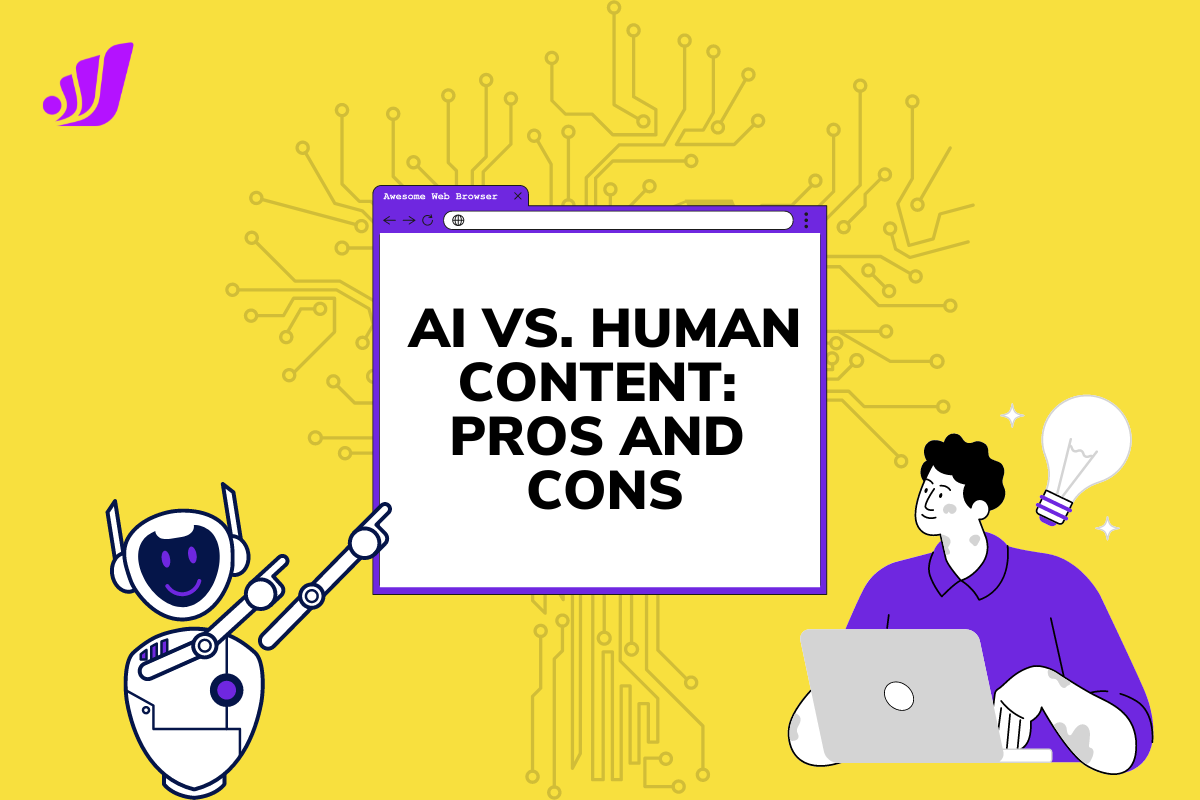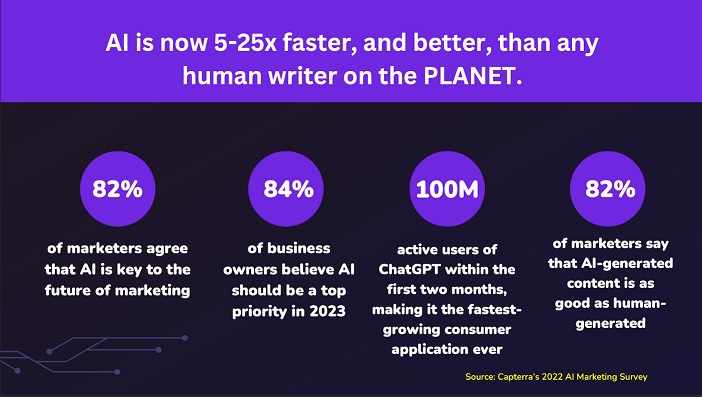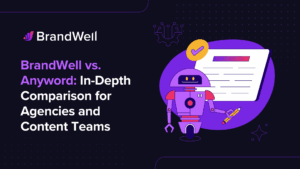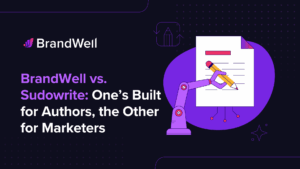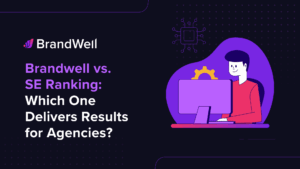As content marketing continues to evolve, the debate over AI vs human content is becoming more prevalent.
First, let’s look at the numbers.
The average time that bloggers spend writing an article is close to 4 hours — a 57% increase from a decade ago!
Why has this happened?
Content writers today have to spend more time producing quality content to stand out among the millions of blog articles already out there. This means hours and hours of researching topics, finding keywords, doing the actual writing, SEO, and sending it to an editor for polishing.
To get people to share your content, you must write something exceptionally good. This was the main challenge with early AI writing tools — readers were able to differentiate between software-written content and human-written content.
But not anymore.
According to a Capterra survey:
- 82% of marketers think AI-generated content is just as good (or even better) than human-written content.
- Almost half (49%) said AI writers are very good at writing clear or easy-to-read content.
- And 88% are investing in AI writing software to save their company time and money.
But what’s the downside of AI writing?
In this blog post, we’ll compare the use of AI content vs human content in marketing and share some of the best practices for adopting AI technology into your business.
Table Of Contents:
- What is AI Content?
- Pros and Cons of AI Content Creation
- The Pros and Cons of Human Content Creation
- The Synergy Between Human Creativity & AI Efficiency
- FAQs – AI vs Human Content
- Conclusion
What is AI Content?
In the rapidly evolving landscape of content marketing and SEO, a new player has emerged that’s changing how we create and consume digital content: Artificial Intelligence (AI).
But what exactly is AI-generated content?
Simply put, it involves using advanced algorithms and machine learning techniques to automatically produce written material. This technology can mimic human writing styles, generate ideas based on specific prompts, and even optimize content for search engines without direct human intervention.
At its core, AI-driven content creation relies on Natural Language Processing (NLP) and Machine Learning (ML). NLP allows computers to understand human language as it is spoken or written. Meanwhile, ML enables these systems to learn from data inputs and improve over time. Together, they form the backbone of content generation tools, enabling them to write articles, blog posts, social media updates, product descriptions, sales letters, and more with increasing sophistication.
AI Content vs. Human Content: What’s The Difference?
AI and human content creators offer distinct advantages and disadvantages.
AI excels in speed, churning out large amounts of consistent, error-free content. However, it can lack creativity and struggle with context, potentially leading to generic or insensitive outputs.
Conversely, human writers bring originality, cultural understanding, and the ability to adapt to specific needs but they are slower, more prone to errors, and come at a higher cost.
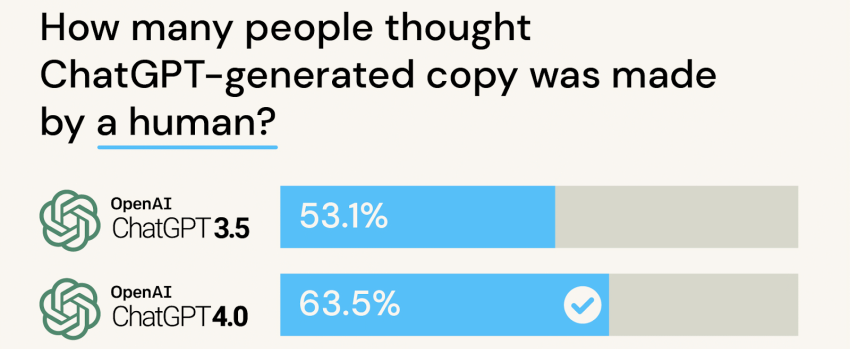
Source: PC Magazine
Pros and Cons of AI Content Creation
In the fast-paced world of content marketing and SEO, finding efficient ways to produce high-quality content is paramount. This has led many to turn towards AI content creation as a viable solution. However, like any tool or technology, it comes with its own set of advantages and disadvantages.
Pros of AI Content Creation
- Efficiency: AI can generate content at a much faster pace than humans, saving time and resources. Tasks that would take hours or even days for a human to complete can be accomplished in minutes or seconds with AI.
- Scalability: Because of its speed, AI can create large volumes of content with ease. Whether it’s generating product descriptions, writing articles, or producing social media posts, AI can scale content creation to meet the demands of any audience size.
- Ideation: Say goodbye to writer’s block. AI tools can help generate ideas and provide keyword suggestions that you can write about to keep your content calendar full.
- Consistency: AI produces content with a consistent style and tone, ensuring uniformity across all materials. This is particularly valuable for brands and organizations looking to maintain a cohesive identity and messaging strategy.
- Data-Driven Insights: No more guesswork! AI can analyze vast amounts of data to identify trends, preferences, and opportunities for creating content that’s tailored to specific audiences and optimized for engagement.
- Personalization: AI can create personalized content experiences by dynamically adapting content based on user behavior, preferences, and demographics. This level of personalization can enhance user engagement and drive conversion rates.
Cons of AI Content Creation
- Lack of Creativity: While AIs are excellent at producing structured information quickly, they often lack the creativity that human writers bring to their work. Unique voices and innovative ideas are almost impossible for algorithms to replicate.
- Potential Quality Issues: A common concern with using artificial intelligence for creating written material involves awkward phrasing or factual inaccuracies due to misinterpretation by the software.
- Ethical Considerations: The use of AI-generated text raises questions about authenticity in journalism, writing, and other areas where originality is crucial. This also includes concerns over copyright infringement when AIs inadvertently create similar texts already protected under intellectual property laws.
AI’s Best Asset: Speed and Efficiency
Still wondering whether AI content writing is worth it? When it comes to speed and efficiency, no human can match AI.
Thanks to tools like BrandWell, marketers can now publish 20 blog posts per week instead of per month. This isn’t just numbers talking; it’s about ensuring your brand gets seen by more eyes.
The beauty of leveraging AI for efficiency doesn’t stop there. By automating content creation, businesses have been able to slash their expenses by as much as 30%. Imagine pumping out more content without breaking the bank. That’s exactly what AI offers businesses today.
But let’s not forget scalability — a word that every marketer loves. With AI tools at your disposal, scaling up your content output becomes a breeze. And if you’re keen on diving deeper into how these technologies are shaping up SEO strategies and beyond, exploring advanced AI SEO tools might just be your next best move.
The Pros and Cons of Human Content Creation
Three out of four marketers are already using AI for content creation. With artificial intelligence sweeping through every industry out there, is there still room for human writers?
While AI can automate certain aspects of content creation and offer efficiency and scalability, human writers bring unique qualities and capabilities to the table that are irreplaceable.
Pros of Human Content Creation
- Authenticity: Human writers bring their unique perspectives, experiences, and emotions to their content, creating an authentic connection with readers. It is this authenticity that fosters trust and loyalty among audiences.
- Creativity: Humans have an unparalleled ability to think creatively, allowing them to generate original ideas, narratives, and concepts that resonate with readers. Human writers can inject creativity into their content, making it more engaging and memorable.
- Emotional Intelligence: Human writers can tap into emotions and empathy, crafting content that elicits emotional responses from readers. Whether it’s humor, sadness, or inspiration, human-written content has the power to evoke a wide range of emotions, enriching the reader’s experience.
- Adaptability: Human writers can adapt their writing style, tone, and voice to suit the needs and preferences of different audiences. Whether it’s tailoring content for specific demographics or adjusting the messaging for different platforms, human writers have the flexibility to create content that resonates with diverse audiences.
- Critical Thinking: Human writers possess critical thinking skills that enable them to produce content that’s well-researched, thoughtfully structured, and intellectually stimulating.
- Brand Personality: Human writers can infuse content with the personality and values of a brand or organization, helping to reinforce its identity and establish a strong brand presence. Human-written content can convey the nuances of a brand’s voice, tone, and values, fostering a deeper connection with audiences.
An example of creativity in action is evident through campaigns like Dove’s Real Beauty Sketches, which leveraged deep emotional insights to create a viral sensation. Such nuanced understanding underscores why many brands still prefer humans behind their most impactful messages.
Cons of Human Content Creation
- Susceptibility to Bias: Unlike AI tools designed with neutrality in mind (though not always perfectly achieved), humans often bring personal biases into their writing unintentionally.
- Takes More Time: Creating high-quality content manually requires significant time investment — from research through drafting revisions until finalization.
- Limited Scalability: Scaling up production without compromising quality becomes challenging when relying solely on human resources as each piece takes considerable effort to produce.
- Higher Costs: Given all factors mentioned, hiring experienced writers — whether in-house or freelance — incurs higher costs compared to subscribing to an AI software solution.
A Human’s Best Asset: Emotional Depth and Creativity
The human touch in content writing brings something no AI can replicate: emotional connection. When writers pour their creativity and personal stories into their work, they transform simple words on a page into compelling narratives that resonate deeply with readers.
This unique ability to craft creative content full of emotion is not just an art; it’s a powerful tool. Research indicates that when narratives tug at emotions, audience involvement leaps significantly. It’s this kind of emotional resonance that turns casual readers into loyal fans and customers.
Making your audience feel something with your words can be the difference between being remembered and being overlooked. Human writers excel at drawing from their own experiences to create stories that speak directly to people’s hearts. Whether it’s joy, sadness, or excitement, these emotions forge stronger connections between brands and individuals.
The decision between using AI versus hiring human writers ultimately depends on your specific project needs and goals. For tasks requiring large volumes of standardized, data-driven content, AI may offer unmatched efficiency and scalability. On the other hand, projects demanding deep thought, critical analysis, and unique perspectives will likely benefit more from the nuanced touch of human expertise.
The Synergy Between Human Creativity & AI Efficiency
When we talk about the sweet spot in content marketing, it’s where AI’s data-driven approach meets human creativity. Combining the strengths of AI and human writers can result in top-notch content that is efficient, engaging, and impactful.
There’s no need to pit AI content vs human content against each other. Here’s how you can use both AI and human writers to create compelling content.
Content Ideation and Research
Use AI tools to analyze data, identify trends, and generate content ideas based on audience interests and preferences.
Human writers can then review these insights and use their creativity and expertise to develop compelling content angles and story ideas.
Content Generation
AI is great at automating routine tasks such as writing hundreds of product descriptions, crafting social media posts, or publishing basic articles.
Human writers can focus on higher-level tasks such as crafting in-depth articles, developing creative campaigns, optimizing AI-generated content, or producing multimedia content that requires a human touch.
Content Optimization
AI tools also excel in content optimization — use them for SEO analysis, keyword research, and A/B testing to improve content performance and visibility.
Human writers can interpret these insights and make strategic decisions to optimize content for both search engines and human readers, ensuring it is both discoverable and engaging.
Editing and Proofreading
AI-powered writing assistants are designed to spot typos and errors in grammar, spelling, and punctuation automatically as you write. They also suggest improvements for better readability.
Your human writer can then refine the content, ensuring it meets quality standards, aligns with brand guidelines, and resonates with the target audience.
Content Personalization
AI algorithms can gather and analyze data on customer preferences, behavior, and demographics so they’re perfect for personalizing content recommendations.
The role of human writers here is to create tailored content experiences that resonate with specific audience segments, addressing their needs, interests, and pain points.
Content Distribution and Promotion
AI-powered content distribution platforms can identify the most effective channels and timing for reaching target audiences.
Meanwhile, human writers are in charge of writing compelling blurbs and teasers to promote the content across various channels, engaging with audiences, and fostering meaningful interactions.
By integrating AI and human writers in the content creation process, organizations can leverage the strengths of each to produce high-quality content that is both efficient and impactful, resonating with audiences and driving business results.
FAQs – AI vs Human Content
What are the advantages and disadvantages of human vs AI?
Humans bring creativity and empathy, making stories resonate. AI excels in speed and data analysis but lacks emotional depth.
What are the benefits of AI in content marketing?
AI boosts efficiency, cuts costs, and personalizes content based on deep consumer insights for better engagement.
What is the difference between AI-written content and human content?
AI churns out facts fast but often misses the mark on nuance. Human writing shines with originality and emotional connection.
What are the pros and cons of AI in social media marketing?
In social media, AI can target ads sharply and automate posts yet struggles to genuinely engage or understand nuances like humans do.
Conclusion
AI brings speed and data-driven insights to the table, making it a powerhouse for efficiency in content creation. But remember, humans pack that emotional punch and creativity that AI can’t match.
AI might be suitable for repetitive tasks, while human expertise shines in creating content that requires nuance and audience understanding. In many cases, combining both AI and human strengths can lead to the most effective content creation. The key to maximizing both resources is AI content humanization — making AI-generated content sound like you!
Mastering content marketing now demands a seamless fusion of technology and human creativity. Use AI for its strengths but never underestimate the power of a human touch to connect deeply with your audience.
Remember: Be smart and efficient with technology but keep your heart in every story you tell.

